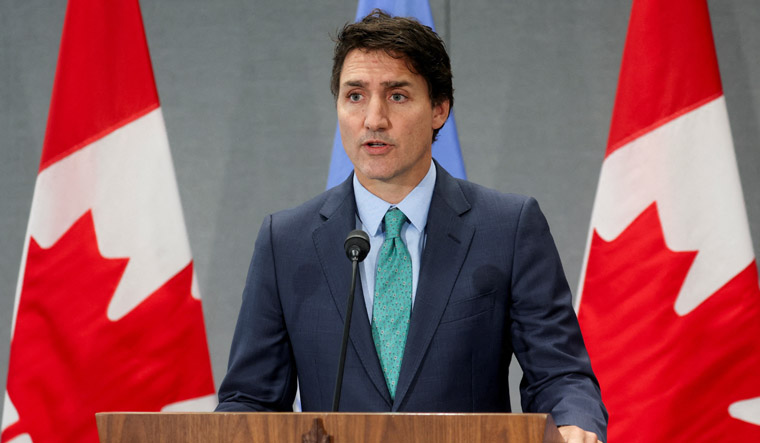Trudeau apologises after Nazi unit war veteran honoured in Canadian Parliament Prime Minister Justin Trudeau has apologised for the Canadian Parliament's recognition of a man who fought for a Nazi unit during World War II, an incident that drew global condemnation and was termed by the Opposition as the "biggest single diplomatic embarrassment" in the country's history.
Trudeau, already under pressure for jeopardising Canada's relations with India over the killing of a Khalistani separatist in Canada, said the Canadian government has reached out to Ukrainian President Volodymyr Zelenskyy, who was present during the event last Friday, in the wake of the incident.
Russia has painted his enemies in Ukraine as neo-Nazis" after the incident although Zelenskyy is Jewish and lost relatives in the Holocaust.
Speaker Anthony Rota, who has assumed responsibility for inviting Yaroslav Hunka, 98, resigned on Tuesday. The incident has drawn global condemnation.
Hunka, who fought with a Nazi unit in World War Two, got a standing ovation and was praised as a Ukrainian and Canadian "hero".
He served in the 14th Waffen-SS Grenadier Division, a voluntary unit made up mostly of ethnic Ukrainians under Nazi command.
Division members are accused of killing Polish and Jewish civilians, although the unit has not been found guilty of any war crimes by a tribunal.
"This was a mistake that has deeply embarrassed Parliament and Canada. All of us who were in this House on Friday regret deeply having stood and clapped even though we did so, unaware of the context," Trudeau told reporters, indicating his plans to personally address the House of Commons about the controversy for the first time since it exploded.
He called the incident a "horrendous violation" of the memory of the millions of people who died in the Holocaust and said it was "deeply, deeply painful" for Jewish people, as well as members of the Polish, Roma, and LGBTQ2S+ communities who were also "targeted by the Nazi genocide", CTV News reported.
"Every year, there are fewer and fewer Holocaust survivors to share firsthand the horrors of what they experienced. And it is therefore incumbent upon us all to ensure that no one ever forgets what happened," Trudeau added before entering the chamber to offer similar remarks.
It was the first time the prime minister personally addressed the House of Commons about the controversy since it exploded.
Facing a series of pointed questions about the internationally condemned situation that transpired during Zelenskyy's address last Friday, Trudeau noted the Speaker was "solely responsible" for Hunka's recognition.
Still, Trudeau said Canada is "deeply sorry" for the position this has put Zelenskyy and the Ukrainian delegation in, calling it "extremely troubling" that such an egregious error, and the images captured of the moment, are being used as propaganda by Russia and its supporters to amplify false narratives about what Ukraine is fighting for.
"Friday's joint session was about what Canada stands for, about our steadfast support of Ukraine's fight against Putin's brutality, lies and violence. It was a moment to celebrate and acknowledge the sacrifices of Ukrainians as they fight for their democracy, their freedom, their language and culture, and for peace. This is the side Canada was on in WW II, and this is the side we are on today," said the prime minister.
While Rota's resignation calmed some of the initial acrimony, Conservative leader Pierre Poilievre and New Democratic Party leader Jagmeet Singh were among those pushing for Trudeau to heed requests from Jewish advocacy groups for a personal apology, noting that it wasn't enough for the Canadians who were feeling the shame the mistake had caused.
Poilievre said inviting Hunka to attend Zelenskyy's historic address to Parliament is the "biggest single diplomatic embarrassment" in the country's history.
Poilievre blamed Trudeau for the mishap despite Rota's assertion that he alone was responsible for inviting the incident.
In the question period, Singh questioned why it took Trudeau so long to say sorry, while Poilievre said Trudeau's apology on behalf of the country didn't go far enough.
The Conservative leader repeatedly called on the prime minister to take personal responsibility for his "personal failure" to vet all attendees, despite the Speaker's guest list not being shared with the Prime Minister's Office in advance, per parliamentary protocol.
For events such as parliamentary addresses, each party in the House is granted a certain allotment of invitations and while a central protocol office compiles those submissions to send the invites, the lists are not shared between parties but are shared with corporate security to facilitate accreditation, according to the Speaker's office.
"When foreign heads of state come here they expect that they will be protected, not only against security threats, but against massive global scale embarrassments and shames like the one he allowed to unfold before Canadians. So, will the prime minister commit to personally calling President Zelenskyy?" Poilievre asked.
While the prime minister did not directly address this question about calling Zelenskyy, his office told CTV News that apologies were made to the Ukrainians at the "ministerial level."
At the moment, the prime minister instead clapped back, questioning why Poilievre has not apologised for a trio of his MPs meeting with far-right German politician Christine Anderson earlier this year.
"If the leader of the Opposition wants the government to help him vet those his MPs meet with, we'd be more than happy to give him some better advice," Trudeau said.
Bilateral relations between India and Canada came under severe strain following Trudeau's allegations of a "potential" involvement of Indian agents in the killing of Khalistani separatist Hardeep Singh Nijjar in British Columbia in June.
Last week, India rejected the allegations as "absurd" and "motivated" and expelled a senior Canadian diplomat in a tit-for-tat move to Ottawa's expulsion of an Indian official over the case.


